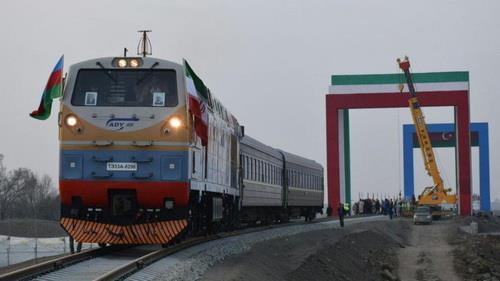2/5/2018 12:00:00 AM - 14:57
Code: 714
Print
Share
Astara-Astara Railroad to Come on Stream Early Next Year

Financial Tribune
“A pilot train loaded with MDF sheets will arrive at Astara Port (Iran) from St. Petersburg in the near future,” Abbas Nazari was also quoted.
The railroad was initially scheduled to become operational in December.
Azerbaijan has already completed the segment from the Azeri city of Astara to the border. Iran has yet to complete the remaining section on its soil.
Nazari noted that IRIR is in talks with Azerbaijan and Russia's rail officials to run passenger and cargo trains from Astara (Iran) to Moscow on this route.
The Astara-Astara Railroad, which is part of a bigger project to connect Iran and Azerbaijan’s rail system, runs 8 kilometers in Azerbaijan up to the border from where it extends 2 km to Iran’s port city of Astara.
The project also includes a bridge on Astarachay River that stretches along the border.
Tehran and Baku are working to connect their railroads as part of the International North-South Transportation Corridor, which is aimed at connecting Northern Europe with Southeast Asia.
The completed section of the railroad was tested in March 2017 after a train set off on a maiden journey from Azerbaijan’s Astara. The train travelled 8 kilometers to the border from where it entered the Iranian section of the route.
Qazvin-Rasht is a missing link in INSTC, which will connect Iran with Russia’s Baltic ports and give Russia rail connectivity to both the Persian Gulf and the Indian rail network.
This means goods could be carried from Mumbai to the Iranian port of Bandar Abbas and further to Baku. They could then pass across the Russian border into Astrakhan before proceeding to Moscow and St. Petersburg, before entering Europe.
The corridor would substantially cut the travel time for everything from Asian consumer goods to Central Eurasia’s natural resources to advanced European exports.
When completed, the INSTC is expected to increase the volume of commodities currently traded between Iran and Azerbaijan from 600,000 tons to 5 million tons per year, dramatically increasing bilateral trade from the current $500 million per year.
According to the deputy head of IRIR, Nourollah Beiranvand, Iran and Azerbaijan plan to sign an agreement on the financing of Rasht-Astara Railroad project this month (February).
Iran’s Deputy Roads and Urban Development Minister Asghar Fakhrieh-Kashan said the Rasht-Astara project will be jointly implemented by Iran and Azerbaijan, each providing 50% of the required finances, noting that Azerbaijan will fund $500 million and Iran will invest the same amount in the project.
